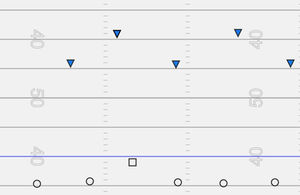A coaching / parenting mindshift
- Coach G
- Jan 11, 2023
- 2 min read
Our son was five years old and, like most males his age, full of energy. We decided to sign him up to participate in a local soccer league. A five year old soccer field is not much larger than a standard back yard and the goals look more like hockey than soccer goals. Three players to a team and the art of passing is not in the equation. I came to adopt the term “amoeba ball” as it was certainly not soccer.
At the first practice, our son proceeded to sit down on the sideline and cross his arms in a defiant posture. He was not going to participate. As a football coach, I was not going to force anyone to play soccer! So, I watched as he sat there for the entire hour. At the second practice, he repeated the same posture and refused to participate. Any concerns I might have had that he would adopt soccer as his passion were certainly fleeing.
At the third and final practice before the first game, he assumed the mediation pose on the sideline but I informed him this would be the last practice and he would not be playing in any games unless he practiced. He scowled at me and then, halfway through the practice, he got up and joined the team. To my dismay, he did all the drills better than his peers. He actually did what the coach was asking and was immediately perceived by his peers to be the best player.
It was obvious that he had been studying the situation. He had been learning the entire time in his own way and on his own time. I was very glad I had not made him join the practice the first two days as I would have been imposing my learning style over his.
We each have our own style of learning. One size certainly does not fit all and there are many elements of learning which can be acquired without participating. I am grateful to my son because he taught me a valuable coaching lesson. I no longer assess a player based upon my initial analysis of their physical capabilities. I have come to appreciate how each process the game differently and to respect each player’s method of learning.
As parents, we have to ask ourselves whether or not the perceived lack of progress with respect to our children’s development is because of our own insecurities and expectations? Might we be the problem and the obstacle to their growth because we want to dictate time, place and manner?
Patience is an area I have had to develop but is instrumental in becoming a learner driven coach and parent. There is a mind-shift which must occur for most learner driven parents whereby we place our trust in our children and their abilities more than our desire for them to reach some arbitrary cultural standard (or even worse force them to adopt our learning style).
I pray that everyone who begins the learner driven journey has the courage to trust their children and to invoke the fruit of the Spirit as they become the cheerleaders their children need.
But the fruit of the Spirit is love, joy, peace, patience, kindness, goodness, faithfulness, gentleness, self-control; against such things there is no law
Galatians 5:22-23
.png)


























Comments